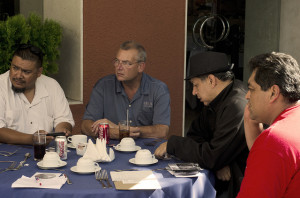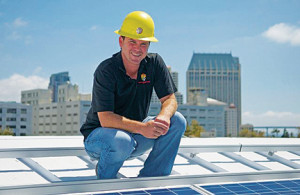Today’s pop-culture roundup […]
Archive for the ‘TIOM’ Category
‘Lucy’ rules box office…
Do You Have The Right To Work?
Do You Have The Right To Work?
 Although the rate of unemployment is declining, many are concerned about the number of jobs, the quality and level of compensation for jobs that are coming into the economic pipeline. Many jobs do not provide enough compensation to travel to work, cover housing expenses, and pay the bills – the family budget is stretching thinner and thinner. For many, the American Dream has been shattered – it is no longer the case that if you work hard, you’ll be compensated well and attain a level of comfortable living and retirement.
Although the rate of unemployment is declining, many are concerned about the number of jobs, the quality and level of compensation for jobs that are coming into the economic pipeline. Many jobs do not provide enough compensation to travel to work, cover housing expenses, and pay the bills – the family budget is stretching thinner and thinner. For many, the American Dream has been shattered – it is no longer the case that if you work hard, you’ll be compensated well and attain a level of comfortable living and retirement.
Face it; some jobs will never come back. There are millions of workers who have “a declining skill set” that once had relevance and value, has been outsourced abroad, is no longer viable, and/or needed in the present economy. Automated technology, corporations shipping jobs overseas, employers chipping away at livable middle class salaries have endangered the American Dream and many corporations have paid the price, i.e. IBM PC, Zenith Solid State TV or CB Radio – corporate names that a typical teenager would have to Google to understand.
The question is, where are the jobs and how do you get them? The service/hospitality industry has thrived through economic downturns, as well as personal services, and skilled labor and specialized fields will remain one of the potential growth areas for jobs.
thrived through economic downturns, as well as personal services, and skilled labor and specialized fields will remain one of the potential growth areas for jobs.
The traditional employer/employee era has been diminished to the point where disparage between upper level/CEO pay and workers has broadened. Companies have been willing to sacrifice investment in their workers’ quality of life to cut expenses and increase profits. Most states have made it easy for such corporate practices to take place. One such example is called “At Will Employment”
At will employment is generally described as follows:
“…any hiring is presumed to be ‘at will’; that is, the employer is free to discharge individuals ‘for good cause, or bad cause, or no cause at all,’ and the employee is equally free to quit, strike, or otherwise cease work.”[5] In an October 2000 decision largely reaffirming employers’ rights under the at-will doctrine, the Supreme Court of California explained:
An employer may terminate its employees at will, for any or no reason … the employer may act peremptorily, arbitrarily, or inconsistently, without providing specific protections such as prior warning, fair procedures, objective evaluation, or preferential reassignment … The mere existence of an employment relationship affords no expectation, protectable by law, that employment will continue, or will end only on certain conditions, unless the parties have actually adopted such terms.
At-will employment disclaimers are a staple of employee handbooks in the United States. It is common for employers to define what at-will employment means, explain that an employee’s at-will status cannot be changed except in a writing signed by the company president (or chief executive), and require that an employee sign an acknowledgment of his or her at-will status. Check your state to see if it is a “At Will” employment state and ask your employer or check your handbook to see if it is a “At Will” company.
Collective bargaining is a process of negotiations between employers and a group of employees aimed at reaching agreements to regulate working conditions. The interests of the employees are commonly presented by representatives of a trade union to which the employees belong. The collective agreements reached by these negotiations usually set out wage scales, working hours, training, health and safety, overtime, grievance mechanisms, and rights to participate in workplace or company affairs.[1]
The union may negotiate with a single employer (who is typically representing a company’s  shareholders) or may negotiate with a group of businesses, depending on the country, to reach an industry wide agreement. A collective agreement functions as a labor contract between an employer and one or more unions. Collective bargaining generally consists of negotiation between union representatives of the workers and the employer on the terms and conditions of employment, such as wages, hours of work, working conditions, grievance-procedures, and the rights and responsibilities of the union and employer. The parties often refer to the result of the negotiation as a collective bargaining agreement (CBA) or as a collective employment agreement (CEA).
shareholders) or may negotiate with a group of businesses, depending on the country, to reach an industry wide agreement. A collective agreement functions as a labor contract between an employer and one or more unions. Collective bargaining generally consists of negotiation between union representatives of the workers and the employer on the terms and conditions of employment, such as wages, hours of work, working conditions, grievance-procedures, and the rights and responsibilities of the union and employer. The parties often refer to the result of the negotiation as a collective bargaining agreement (CBA) or as a collective employment agreement (CEA).
 To gain further insight into unions and their advocacy for working families, TIOM sat down and spoke with Johnny Simpson, Business Manager with the International Brotherhood of Electrical Workers (IBEW) Local 569. (The following questions were selected by TIOM, submitted by our readers).
To gain further insight into unions and their advocacy for working families, TIOM sat down and spoke with Johnny Simpson, Business Manager with the International Brotherhood of Electrical Workers (IBEW) Local 569. (The following questions were selected by TIOM, submitted by our readers).
1. What are some of the miss-truths about unions?
JS –Unions are not a bunch of thugs. We’re working to keep California and our nation competitive, enhance the quality of life of workers, give the next generation the skills to stay ahead of new technologies, and partner with employers and businesses to keep jobs here in the USA and invest in workers. That story doesn’t get told as often as it should.
2. What are the benefits of being in a union?
JS –Unions are a simple concept: strength in numbers. When working people stand together, we are able to accomplish more to raise standards our of living so working families can earn good wages and obtain a better life. That’s what the American Dream is all about.
3. Do you think unions get a bad rep and why?
JS –In their attempt to diminish workers, some corporate special interests try to vilify unions and our advocacy for working families. But, Unions are a simple concept that date back to our grandparents generation: when working people stand together, we are able to create a better standard of living for everyone, whether that is the 40-hour work week, paid vacation time or better wages. Our parents and grandparents and unions built our middle-class brick-by-brick. Today, we see that American Dream being dismantled by Wall Street bankers and corporate interests that put profits above people.
4. How does IBEW assist the community?
JS –IBEW recruits and trains local people in the community to become state-certified electricians and we place them in jobs with one of the hundreds of electrical contracting companies who partner with us. We give people the foundation for a long-lasting, skilled, middle-class career and we work with community partners to raise safety standards so electricians can stay safe on the job.
From building the hospital around the corner, to volunteering as Little League coaches, to pitching in to collect donations for a local food drive, IBEW electricians are your neighbors, your friends and your community leaders. It is more important than ever for working people to stand together and keep the American Dream strong for us and the next generation.
5. What are some of the services IBEW provides?
JS –When an IBEW electrician shows up at your door, you know you are getting someone who is state-certified and an expert in the field. Whether you need some electrical work done around your home, would like to have a solar system installed, or are a business owner that needs some commercial work done on your facility, IBEW electricians do the job right the first time. We pride ourselves on being the best in the industry and hold ourselves to a high standard of service and training.
6. What opportunities are available through IBEW?
JS –We are all about giving people a foot in the door to a middle-class career as a union electrician. Whether you are one of the many vets returning back from the wars and need a new career, or are a mom looking for an opportunity to support your family with a good job that has family healthcare and a secure retirement, or if you aren’t afraid to work hard and you enjoy using your mind and your hands, we’re the place for you.
Earlier this month, IBEW 569 congratulated our new Fast Start graduates. These sound apprentices just finished a 7 week fast start program where they got a crash course on all the low voltage systems, along with tool safety, Osha training and CPR. The graduates are all going to work for contractors and will now go to school 2 nights a week for the next 3.5 years to graduate as a Journeyman Sound Tech.
7. List a few projects that are of significance?
 JS –IBEW electricians are working all over the community – everything from hospitals to clean energy solar farms to installing energy-efficient lighting in buildings and streetlights so we can increase energy efficiency andsave money on energy bills. Some projects you might recognize that were built by IBEW electricians are Petco Park, the beautiful new downtown library and the Scripps Proton Therapy Center that is providing innovative ways to treat cancer. This work is being done by skilled, highly trained professionals who make sure everything is working right, built safely and completed on time and on budget.
JS –IBEW electricians are working all over the community – everything from hospitals to clean energy solar farms to installing energy-efficient lighting in buildings and streetlights so we can increase energy efficiency andsave money on energy bills. Some projects you might recognize that were built by IBEW electricians are Petco Park, the beautiful new downtown library and the Scripps Proton Therapy Center that is providing innovative ways to treat cancer. This work is being done by skilled, highly trained professionals who make sure everything is working right, built safely and completed on time and on budget.
8. What would be the story you would like to tell the public about IBEW and unions?
JS –Unions are fighting for working families and a better quality of life. Over the past few decades, large corporations and Wall Street bankers have been systematically dismantling the middle-class. If we don’t stand strong together, there will be nothing left for the next generation. We want a better standard of living and that is becoming harder and harder. The only thing standing in the way of this race-to-the-bottom is working people standing together.
Jobs – Jobs – Jobs are what’s needed to strengthen the economy and put to work for Main Street America. Finding those jobs is the key and being qualified for those jobs is paramount. Learning a new trade or skill is important in the market today. Keeping up with new technology is also necessary to secure a new job or get a promotion.
IBEW Local 569 members are skilled professionals who receive ongoing training throughout their career at our Electrical Training Centers located in San Diego and Imperial Counties. Not only are our members prepared for emerging technologies, they drive industry innovation. To learn more about IBEW go to www.ibew569.org.
Additionally, on Saturday, July 27th, IBEW Local 569 will host the Apprentice Information Career Day at the Malcolm X Library located at 5148 Market Street, San Diego, 92114 from 10:00am – 2:00pm. We hope you will attend to learn about education and career opportunities with building trades, including electrical work – these careers provide great compensation and benefits.
—-
The Image Of Magazine is proud to announce the start of our new menu page Industry Jobs Labor Works, as a tool to find the latest in jobs, technology, entrepreneurial opportunities and persons of interest who are creating business opportunities. We invite comments and opinions on what it takes to get America back to WORK or of someone or business that are providing opportunities for jobs. Please contact our office by email; [email protected] to reply or submit a point of view.
The Uncensored Triumph of Neko Case
Photo: Courtesy of ANTI- Records Neko Case […]
How Britney Spears became a feminist role model
Britney Spears At the top of the […]
Little miss perfect
Courtney Love: "Artists can self-destruct so easily. […]
Beyoncé named most powerful celebrity
NEW YORK: U.S. pop singer Beyoncé, basketball […]
… Cher turns back time
Cher performs in concert at Rexall Place […]
The Bacon Brothers to Play MPAC, 7/20
The Bacon Brothers to Play MPAC, 7/20 […]
Dustin Lynch Hits the West Coast
 San Diego, California or the West Coast has not been know for its Big Country Western sound in the music industry. When you think about San Diego and the West Coast sound, you think of The Beach Boys, Van Halen, Katy Perry, Snoop Dogg, P.O.D., Poncho Sanchez (raised in Norwalk) and a host of other sounds. You may not see them all on stage at one time but they all represent the diversity in sound that is the west coast. California has not been on the top of the list in producing great country western singers and musicians. East County communities of San Diego have long been and are big supporters of country music. With small pockets of Country & Western venues sprinkled here in there (InCahoots in Mission Vally and Double Duces in the Gaslamp), it will be hard to find a bar with a mechanical bull to ride and/or enjoy watching a good ride, let alone do the most up to date 2 step. In Comes Dustin Lynch out of Nashville, Tennessee, bringing a little Country Swag to San Diego. Dustin Will be peformong live Sunday night @ 8:00pm PST, inside ethe all new Tin Roof Bar & Restaurant, in the heart of the Gaslamp. The Tin Roof is San Deigo’s newest performing venue where music is LIVE and so is the crowd. Will this be the start of the new invasion of Country to San Diego?
San Diego, California or the West Coast has not been know for its Big Country Western sound in the music industry. When you think about San Diego and the West Coast sound, you think of The Beach Boys, Van Halen, Katy Perry, Snoop Dogg, P.O.D., Poncho Sanchez (raised in Norwalk) and a host of other sounds. You may not see them all on stage at one time but they all represent the diversity in sound that is the west coast. California has not been on the top of the list in producing great country western singers and musicians. East County communities of San Diego have long been and are big supporters of country music. With small pockets of Country & Western venues sprinkled here in there (InCahoots in Mission Vally and Double Duces in the Gaslamp), it will be hard to find a bar with a mechanical bull to ride and/or enjoy watching a good ride, let alone do the most up to date 2 step. In Comes Dustin Lynch out of Nashville, Tennessee, bringing a little Country Swag to San Diego. Dustin Will be peformong live Sunday night @ 8:00pm PST, inside ethe all new Tin Roof Bar & Restaurant, in the heart of the Gaslamp. The Tin Roof is San Deigo’s newest performing venue where music is LIVE and so is the crowd. Will this be the start of the new invasion of Country to San Diego?
The note on the Bluebird Café’s Facebook page says it all: customers who visit the Nashville songwriters club – instrumental in the development of Garth Brooks, Faith Hill and Kathy Mattea – are expected to keep quiet and listen to the words from some of Music City’s most influential composers.
It all goes back to the Bluebird for Lynch, a native of Tullahoma, Tennessee. Influenced in his youth by such stalwart country singers as Alan Jackson, Garth Brooks and Clint Black, Lynch knew the importance of the Bluebird, and he chose his college – David Lipscomb University – in part because it was less than two miles from the club, which proved immensely important in his development.
Listening has an added benefit – it gives the listener a chance to learn.
That’s how singer-songwriter Dustin Lynch used the Bluebird. And he used it intensely. He rented an apartment behind the venue’s back parking lot and literally walked to the Bluebird several times a week to listen and learn about the mysterious art of creating songs from some of Nashville’s most important writers. Don Schlitz (“The Gambler”), Tony Arata (“The Dance”), Paul Overstreet (“Forever And Ever, Amen”) – all are mainstays of the Bluebird legend, and it was at their proverbial feet that he picked up key insights about the writing process.
“I was soaking it in, trying to be a sponge,” Lynch says. “I was mainly trying to hear the story behind the song, how it came about, what it’s really about. There’s something about understanding the songwriter’s realm. You get a little more grip on the way it was written and why it was written and how they got to the finished product.”
 That education paid off in a big way for Lynch. He signed with Broken Bow Records – the home of Jason Aldean and sister label to Stoney Creek Records (home to Thompson Square) .His debut single, “Cowboy and Angels,” is quickly rising up the Country charts. Lynch is working with producer Brett Beavers (known for his work with Dierks Bentley) and engineer Luke Wooten (Brad Paisley, Sunny Sweeney) on his debut album (due August 21, 2012) with a backlog of his own songs. He’s written that material with a bundle of Music City’s top writers – Dallas Davidson (“Just A Kiss”), Tim Nichols (“Live Like You Were Dying”), Casey Beathard (“Don’t Blink”), Phil O’Donnell (“Back When I Knew It All”) and Steve Bogard (“Prayin’ For Daylight”), to name a few.
That education paid off in a big way for Lynch. He signed with Broken Bow Records – the home of Jason Aldean and sister label to Stoney Creek Records (home to Thompson Square) .His debut single, “Cowboy and Angels,” is quickly rising up the Country charts. Lynch is working with producer Brett Beavers (known for his work with Dierks Bentley) and engineer Luke Wooten (Brad Paisley, Sunny Sweeney) on his debut album (due August 21, 2012) with a backlog of his own songs. He’s written that material with a bundle of Music City’s top writers – Dallas Davidson (“Just A Kiss”), Tim Nichols (“Live Like You Were Dying”), Casey Beathard (“Don’t Blink”), Phil O’Donnell (“Back When I Knew It All”) and Steve Bogard (“Prayin’ For Daylight”), to name a few.
 Click here to watch Dustin's Video Where It's At
Click here to watch Dustin's Video Where It's At
San Diego will be honored to have a rising star such as Dustin Lynch perform in an area where Country Music is not one of the staple products or sound. Look for a follow up interview soon in The Image Of Magazine, as we follow the career of this soon to be mega star. We are looking forward to supporting Dustin in his rise and keep his Country Swag alive here on the West Coast. So if your father loves Country, show him that you really care and bring him to a one of a kind show in San Diego.
Tommy Jennings
Editor – The Image Of Magazine
Jennifer Lopez, at peace with herself
Jennifer Lopez In the course of one […]

